正反译与反正译
翻译技巧 之正说反译与反说正译

e.g. 800 people had been saved by the organization.
组织拯救了800人.
3、翻译成汉语判断句:不突出被动动 作,而着重于对事 物的状态、过程和性 质等加以描述,经常采用“是……的” 判断句。
e.g. This kind of device is much needed in the mechanical watch-making industry.
我一时想不起来这个名字。
2.Negative in English, Affirmative in Chinese 反说正译
e.g. My overcoat would not wear out.
我的大衣十分耐穿。
3.Double Negative for Emphasis 双重否定为强调
e.g. He was no small reputation as a scientist.
这种装置在机械表制造业中是很重要的。
4、把被动句中的“被”字用其它字替 代:“被”— “受、遭、让、由、得以、 受到、遭到、为……所”等。
e.g. The proposal on the improvement of the investment environment is accepted by all the members of the committee.
这条关于改善投资环境的建议为该委员会 全体委员所接受。
5、被动惯用句型:泛指我们、人们、 有人、大家等。
有人认为...
e.g. It is believed that almost all sudden deaths are caused by damage to the heart.
正说反译反说正译法

• She正sai说d an反gr译ily,法the(me形n a容re a词ll b)ad!
• 她愤愤地说,男人都不是好东西! • You are a bad boy! • 你是个不听话的孩子! • The company’s failure was due to bad
management. • 公司因经营不善破产。 • Bad living habits • 不良的生活习惯
university. • 我得不到上大学的机会。
团结 信赖 创造 挑战
正说反译法(动词)
• Today he failed to get to school on time. • 他今天没有准时到校。 • If the crops fail there will be a serious food
• 他从这项计划中没有获得什么利益。 • Some people think that man is the least
reliable scientific instruments. • 有些人认为人是最不可靠的科学仪器。 • But firemen succeeded in confirming the
possibilities of doubt. • 证据确凿,毋庸置疑。 • People under 21 are excluded from
joining the club. • 二十一岁以下的人不得参加这个俱乐部
团结 信赖 创造 挑战
• The plan failed and for years he lost his political power.
团结 信赖 创造 挑战
正说反译法(虚词)
• Few of my friends speak French. • 我的朋友中几乎没有人说法语。
正说反译反说正译法
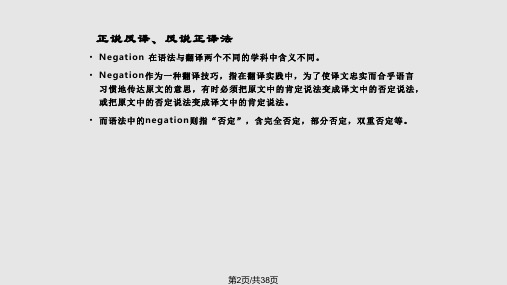
• 那些革命者当时受到拷打,不准阅读任何书 刊..
• The window refuses to open.
single family, was solved quickly by the collective. • 个别家庭无力解决的这个问题,通过集体能迅速得到解决。
第19页/共38页
正说反译法(介词)
• There is nothing in this shop above $5. • 这家商店卖的东西价钱都不超过5美圆。 • Leifeng’s noble deeds are above all praise • 雷锋的高尚事迹令人赞扬不尽。 • He is above meanness and deceit. • 他不至于做卑鄙和欺骗人的事情。 • Her behaviour was above suspicion. • 她的品行不容怀疑、
• 由于看不到、也不去分析语言问题与非语言问题 之间的相互关系,产生了两大不足
• This failure was the making of him.
• 这次不成功是他成功的基础。
• The government第’16s页/f共a38i页lure to carr y out
• Tom will be in charge of the office during my absence. • 我不在的时候,办公室由汤姆负责。 • Why does he say nothing about the total absence from his list
实用翻译技巧:正译法和反译法
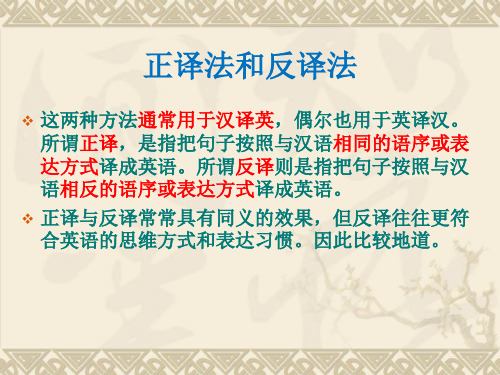
❖ (1)I believe strongly that it is in the interest of my countrymen that Britain should remain an active and energetic member of the European Community.
❖ 我坚信,英国依然应该是欧共体中的一个积极的和 充满活力的成员,这是符合我国人民利益的。(部 分倒置)
❖ (2)Stormy applause broke forth the moment she appeared on the stage.
❖ 她一出现在台上,就爆发出雷鸣般的掌声。
❖ (3)改革开放以来,中国发生了巨大的变化。 ❖ Great changes have taken place in China
❖ (6) Please withhold the document for the time being. ❖ 请暂时扣下这份文件。(正译) ❖ 请暂时不要发这份文件。(反译)
六、倒置法
❖ 英汉双语经常出现语言表达顺序不对等的情况。比 如:在汉语中,定语修饰语和状语修饰语往往位于 被修饰语之前;在英语中,许多修饰语常常位于被 修饰语之后,因此翻译时往往要把原文的语序颠倒 过来。
(反译)
❖ (2) 你可以从因特网上获得这一信息。 ❖ You can obtain this information on the Internet. (正译) ❖ This information is accessible/available on the Internet.
7正反、反正译法

【译文】凡是活在世上的人都曾有过神仙般 的几段绝好时光。(双重否定表示强烈肯定)
12
例5:The significance of these incidents wasn’t lost on us.
【译文】这些事引起了我们的重视。
例6:He has no small chance of success.
【译文】她忍住没有笑。
例5:The thick carpet killed the sound of my footsteps. 【译文】我走在厚厚的地毯上一点儿声 音也没有。
18
例6:The pursuit of science withdraws interest from external things. 【译文】科学家由于致力于科学研究, 对外界事物总是不感兴趣。 例7: My guess is as good as yours. 【译文】我的猜测并不比你的高明。
14
课堂互动1: 翻译句子, 注意否定译肯定
1.Students, with no exception, are to hand in their papers this afternoon. 【译文】今天下午,学生统统要交上书面作业。 2.Styles come and go, but good taste is timeless. 【译文】文风随时在变,而文雅是永恒的。 3.All the articles are untouchable in the museum. 【译文】博物馆内一切展品禁止触摸。 4. No one has nothing to offer to society. 【译文】人人对社会都有所贡献。(双重否定用 来表示强烈肯定)
第九章正反反正翻译法
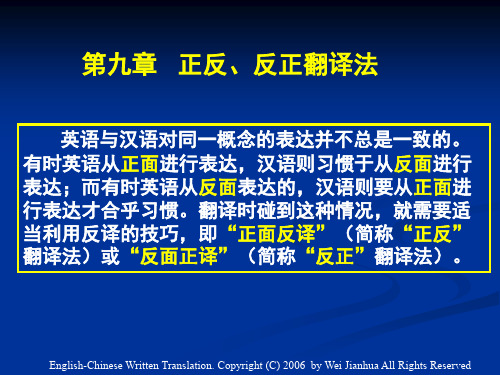
English-Chinese Written Translation. Copyright (C) 2006 by Wei Jianhua All Rights Reserved
(4)副词
little 一点不 hardly 几乎不 seldom 不常
barely 几乎不/无遮蔽的 rarely 不常/不平凡的 absently 心不在焉地
(3) 连词
before 决不/还未来得及 unless 如果不… or (else) 要不然/否则
rather than 宁可…也不愿 until 不到…的时候 if anything 如果有什么不同
课堂练习
1. The guerrillas would fight to death before they surrendered.(游击队员宁愿战斗到死,而决不投降。)
2. The tower fell down before many people escaped.
(大楼倒塌时,许多人还未来得及撤离。)
3. She would rather live a poor life than is the millionaire’s wife.(她宁可受穷,也不愿做这位百万富翁的老婆。)
wonder 不知道
fancy 想不到
lose 抓不住 / 听不见/ 看不见
例: 1、The first bombs missed the target.
第一批炸弹没有击中目标。
2、Such a chance was denied me. 我没有得到这样的机会。
English-Chinese Written Translation. Copyright (C) 2006 by Wei Jianhua All Rights Reserved
7正反、反正译法

20
课堂互动2: 翻译句子, 注意肯定译否定
1.She was refused admittance by them. 【译文】他们不让她进去。 2.His noble deeds are above all praise. 【译文】他的高尚行为是赞扬不尽的。 3.The mistake escaped me. 【译文】我没注意到这个错误。 4.The truth is quite other than what you think. (other than = not, anything but) 【译文】事实真相与你想的完全不同。
【译文】她忍住没有笑。
例5:The thick carpet killed the sound of my footsteps. 【译文】我走在厚厚的地毯上一点儿声 音也没有。
18
例6:The pursuit of science withdraws interest from external things. 【译文】科学家由于致力于科学研究, 对外界事物总是不感兴趣。 例7: My guess is as good as yours. 【译文】我的猜测并不比你的高明。
句子的翻译-正反法

c. 形容词和形容词短语:few, little, free from, far from, safe from, short of等等
这次演出根本没有失败,而是十分成功。
The show was far from being a failure; it was a great success.
13
把马克思主义的普遍真理同我国的具体实 际结合起来,走自己的道路,建设有中国 特色的社会主义,这就是我们总结长期历
史经验得出的基本结论。
To integrate the universal truth of Marxism with the concrete realities of China, blaze a path of our own and build socialism with Chinese characteristics — —this is the basic conclusion we have reached in summing up the long historical experience.
句子的翻译-正反法
1
正反——反正翻译法
英语和汉语均有从正面或反面来表达一种 概念的现象。如果原文从反面表达直译出 来不合乎译语习惯,就可考虑从正面表达, 反之亦然。使用哪种方法,主要看译语表 达习惯及修辞效果而定。
2
正——反翻译法例句: Herb may be dying somewhere, calling out for his mum and
他显然有不同的想法。 He evidently thinks otherwise. 我根本不知道他会遇到什么麻烦。 I little knew what trouble he was going to
正反、反正译法

(二)英译汉反说正译法:英语从反面表达, 汉语从正面表达
反正译是用变换语气的方法把原文的否定式译成 汉语的肯定式。翻译时运用这一方法可使译文自然 流畅。 英语中含有否定词语的结构和双重否定的结构常有 这种方法来解释。英语中表达否定意思的词或词组 指带有de-, dis-, im-, in-, un-, less-等词缀的词和 no, not, not…until, no less than, no more than, Nothing than, nothing but, cannot…too 等表示 否定的词或词组。
赶快把这封信寄出去。
She is no less diligent than her sister. 她和她姐姐一样用功。 Such things couldn’t long escape notice. 这类事情迟早会被人发觉的。 We did not notice this matter until yesterday. 直到昨天我们才注意到这件事。 We can not be too careful in doing experiments. 我们做实验越仔细越好。
(一)英译汉正说反译法:英语从正面表达, 汉语从反面表达
正反译是用变换语气的方法把原文的肯定式译成 汉语的否定式。翻译时运用这一方法可使译文合乎 汉语规范,更恰当地表达原文的意思。
例如, correct 可译成“没有毛病”,wonder可译成 “不知道”,exactly可译成“一点不错”,anythi but可译成“一点也不”等等。
Never too old to learn. 活到老,学到老。 I couldn’t agree more about it. 我对此非常赞同。 His story was nothing but lies. 他的那番话纯粹是谎言。 Our advice was not lost on him. 我们的劝告对他起了作用。 There is no rule but exceptions. 凡规则总有例外。 Don’t lose time in posting this letter.
5 正反、反正译法

正说反译(连接词)
• The guerrillas(游击队员) would
fight to death before they surrendered.
游击队员宁愿战斗到死,而决不投降。
正说反译(连接词)
• You will fail unless you work harder.
正说反译(动词)
• The first bombs missed the target. 第一批炸弹没有击中目标。 • The two teams tied. 两队不分胜负。 • Live up to the expectations of our own people。 不辜负全国人民对我们的期望。
不要客气。/别见外 。
正说反译
He was the last man to say such things.
他绝不会说这样的话。
反说正译
• The thought of returning to his native land never deserted him. 归国的念头始终萦绕在他的心中。
• Isn’t it funny! 真逗!
反说正译
• The doubt was still unsolved after his repeated explanations. 虽经他一再解释,疑团仍然存在。
• Don’t lose time in posting this letter.
赶快把这封信寄出去。
他很想尽快和你见面。
反说正译
• There is no rule that has no exception.
任何规则都有例外。 • Its significance and importance can never be overemphasized. 它的意义和重要性,不管怎样强调,
英语翻译正说反译反说正译

英语翻译正说反译反说正译第八章英翻译技巧(五)正说反译反说正译正说反译、反说正译的应用不论是正说反译还是反说正译,究其原因归纳起来主要是:保证语义明确、加强修饰效果、尊重汉语习惯,保证译文通畅易懂。
所谓反面表达,是指英语词句中含有“not”,“never”,“no”,“un-”,“im-”,“ir-”,“in-”,“less-”等否定成分,汉语词句中含有“不”、“没”、“无”、“未”、“甭”、“别”、“休”、“莫”、“毋”、“勿”、“非”等否定成份,不含这些成份的为正面表达。
(一)正说反译的应用1.谓语动词或动词词组本身表示否定意义,常见的有:Fail, fizzle out, fall short, be frustrated, escape, elude, slip away, stop, cease, overlook, ignore, neglect, refuse, grudge(怨恨,不情愿做), disdain, reject, turn down, forbid, prohibit, exclude from, bar, ban, expire, be blind to, deny, avoid, omit, forget, prevent from, live up to, resist, miss, lack.I missed what you have said because of the noise outside.由于外面的噪音,我没听清楚你说的话。
To our disappointment, he failed to take the overall situation into account. 使我们失望的是他不顾大局。
Such a chance was denied to me.我没有得到这样一个机会。
2.介词或介词短语含否定之意,常见的词有:Above, against, below, beneath, beyond, instead of, out of, without, but for。
正反、反正翻译法 ppt课件

The thought of returning to his native land never
deserted him.
归国的念头始终萦绕在他ppt课的件 心中。
16
(3)形容词
英文反面,译文正面
He was an indecisive sort of person and always
would probably have been a success. • 如果他不发脾气,谈判很可能已经成功了。 • The mistake escaped me. • 我没注意到这个错误。
ppt课件
6
正反、反正表示法
• (二)副词
• We may safely say so. • 我们这样说错不了。
• 在中文中,正面和反面表达主要是指是否
用“非”,“无”,“没(有)”,
“未”,“否”等字。
ppt课件
5
正反、反正表示法
• 一、英语从正面表达,译文从反面表达 • (一)动词 • Such a chance was denied me. • 我没有得到这样一个机会。 • If he had kept his temper, the negotiation
carefully and cautiously as he does the unfamiliar.
科学家们在处理熟知的事物时,必须像处理陌生
的事物一样小心谨慎。ppt课件
17
(四)名词
1.It was said that someone had sown discord among them. 据说有人在他们中间挑拨离间。
样的话。
Good winner, good loser. 胜不骄,败不馁。
句子翻译_正说反译、反说正译

• •
反说正译
• • • • • • • • 4.副词和副词短语: otherwise, little, too…to等等。 他显然有不同的想法。 He evidently thinks otherwise. 我根本不知道他会遇到什么麻烦。 I little knew what trouble he was going to have. 他兴奋得说不出话来了。 He was too excited to speak.
反说正译
• • • 5.连词: unless, before, until, rather than, or 等等。 不了解这一点,就不能得到起码的知识。 Unless we grasp this point we shquire even elementary knowledge. 部队宁可绕道走,也不踩庄稼。 The troops would rather take a roundabout way than tread on the crops. 他宁愿饿死,不愿行窃。 He will die of hunger before he steals.
反说正译
第三,英语有更简练而恰当的表达 法。 • 人不可貌相。 Beauty is but skin deep. 第四,把原文隐含的意思明了化。 • 我觉得这么做后果不妙。 I think the worst of the problem is behind us.
反说正译
• 日子很快过去了,她做工却丝毫没有松懈。 • The days passed quickly, but she worked as hard as ever. • 他不在,我感到很寂寞。 • In his absence, I felt very lonely. • 我很高兴看见你安然无恙。 • I am glad to see you safe and sound. • 他们的供应不足,冬季又将来临。 • Their supply line was thin and winter was coming on. • 他不自然地咳了起来。 • He coughed with embarrassment.
翻译-正反、反正法.ppt

正说反译法 (Negation)
名词
副词 英语中有些否定概念是通过含有 动词或动词短语 否定意义或近似否定意义的词来表达 形容词或形容词短语 的。这类词从词形上看是肯定式 ,一 介词或介词词组 般被称之为“含蓄否定词”或“暗指 连接词及其短语 否定词”。英语中的含蓄否定词或含 蓄否定短语一般都要译成汉语的否定 某些固定短语
菲利普误了最后一班公共汽车,茫然不知该怎么办。
句子
His grandmother is already 80, but she carries her years lightly.
他祖母已80岁了,可是并不显老。
I am wiser than to believe such stories
我还不至于蠢到竟然相信这种谎言。
他走进那所危楼。
Examples
A radar screen is not unlike a television.
雷达荧光屏跟电视荧光屏一样。
Don’t stop working,” he said
他说:”继续干活吧。”
He knew he was mortally ill.
他知道他得的是不治之症。
从以上例子中,我们可以看到, 有些句子从正面译不顺,不妨从反面 译;反面译不顺,则不妨从正面译, 因为同一个概念,一个民族正着说, 以为是合乎表达习惯的,而另一个民 族则认为反着说才顺嘴。因此,在恰 当的场合灵活运用正反译法不失为确 保译文语义明晰、文从字顺的有效手 段。
Definition
英语里有些从正面表达的词语或句子,汉 译时可以从反面来表达,即正说反译法 (negation); 英语里有些从反面表达的词语或句子,汉 译时可从正面来表达,即反说正译法 (affirmation)。
翻译3.6:正译与反译

与其整天开车到处寻找停车位,我还不如坐公交车进城呢。
5
6. 正译与反译——正说反译
5. 名词
absence (缺席),failure (不成功),refusal (拒绝), ignorance (无知) 1) In the absence of any evidence, the police had to let Anders go.
过马路时你们千万要加倍小心。
12
6. 正译与反译——汉译英中的正反译法
在汉译英时,某些否定结构不一定用英语否定词,也 可以恰当地使用某些含有否定意义的词语,以确保语 言的丰富,例如:
1)镇中心变化很多,根本认不出来了。 The town center has changed beyond all recognition. 2)她的品行不容怀疑。 Her conduct was above suspicion. 3)我得不到上大学的机会。 I was denied the chance of going to university. 4)我茫然不明白发生了什么事。 I was at a loss (to understand) what had happened. 5)我们迟到了,未能听到音乐会的第一部分。 We were late and missed the first part of the concert.
译文(3):闹铃响了而依然熟睡的人则很可 能会梦到门铃或电话铃响。 在该句翻译中,译文(1)将“sleeps through their alarm”直译为 “睡过闹铃”,不符合中文表达习惯,而译文(2)则处理为“熟睡 而没有听到闹铃”,为我们提供了“正说反译”的一个范例。译文 (3)也不失为一种可取的译法。
第八章 正说译和反说正译

译两种。 选择性反译是指可反译也可不反译的情况, 是否反译主要应根据它在译文中的表达效 果和该句所在的具体语境而定。
2.The thought of returning to his native land never deserted him amid his tribulation
在苦难中,归国的念头一直在他心中萦绕着。(反说正 译) 这是两个英译汉的实例,汉译英亦是如此。
正说反译
正说反译(动词)
正说反译(动词)
5.Mind your own business. 别多管闲事。 6. He was 75, but he carried his years lightly. 他七十五岁了,可是并不显老。
正说反译(形容词)
经常正说反译的形容词和短语有︰
ignorant, constant, neglected, neglectful of, regardless of, free from, safe from, short of, thin, absent, ill, out of, foreign to, the last, bad, weak, deceptive等。
正说反译与反说正译
在翻译中,之所以采用正说反译、反说正译的变 通手法主要是为了达到以下两个目的:让译文准 确,忠于原文;使译文表达符合译语表达习惯。 试举一例: 1.Her husband hates to see her stony face.
她丈夫不愿见到她那张毫无表情的脸。(正说反译)
正说反译与反说正译
由于英汉语言在思维方式和表达方法上的差异, 进行英译汉时,有些句子按字面意思正面表述不 能忠实地表达原义,而从反面表达则可能达到与 原文等值或近似等值的效果,在以下情况下,最 好,甚至必须进行逆向翻译。一、当正面翻译难 以表达原义时;二、当正面翻译意义不明确,容 易产生误解时; 三、当逆向翻译使重点突出, 表达有力时;四、当逆向翻译使译文表达更连贯 顺畅,更符合汉语规范时;五、当逆向翻译更简 洁清晰时。
翻译-正反、反正法

有许多能源尚未开发 尚未开发。 有许多能源尚未开发。问题始终是要以一合理的代价利用这些 能源。 能源。
He went into the insecure building.
他走进那所危楼。 他走进那所危楼。
Examples
A radar screen is not unlike a television.
雷达荧光屏跟电视荧光屏一样。 雷达荧光屏跟电视荧光屏一样。
Don’t stop working,” he said
Negation & Affirmation
Zhang Xiaowen An Qing Qi Yue Ding Xiaoyu
Iห้องสมุดไป่ตู้troduction
英语和汉语中往往均可用肯定形式或 英语和汉语中往往均可用肯定形式或 否定形式表达同一概念。 否定形式表达同一概念。但由于讲英语国家 的历史、地理、 的历史、地理、社会文化背景和生活习性与 我国不同,因此这些国家人们的思维方式 思维方式与 我国不同,因此这些国家人们的思维方式与 我们有时存在很大差异。 我们有时存在很大差异。这种差别体现在语 言习惯上,便产生了两种语言各自独特的表 言习惯上, 达形式。 表示否定意义时, 达形式。在表示否定意义时,这种差异显得 尤为突出。 尤为突出。英语的否定表达是一个常见而又 比较复杂的问题。有的英语句子形式上是否 比较复杂的问题。有的英语句子形式上是否 定的而实质上肯定的,有的形式上是肯定的 定的而实质上肯定的,有的形式上是肯定的 而实质上是否定的。 而实质上是否定的。
正说反译与反说正译
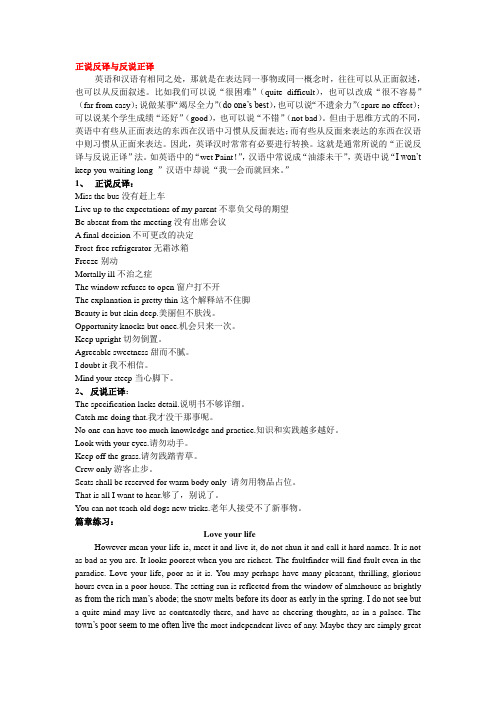
正说反译与反说正译英语和汉语有相同之处,那就是在表达同一事物或同一概念时,往往可以从正面叙述,也可以从反面叙述。
比如我们可以说“很困难”(quite difficult),也可以改成“很不容易”(far from easy);说做某事“竭尽全力”(do one’s best),也可以说“不遗余力”(spare no effect);可以说某个学生成绩“还好”(good),也可以说“不错”(not bad)。
但由于思维方式的不同,英语中有些从正面表达的东西在汉语中习惯从反面表达;而有些从反面来表达的东西在汉语中则习惯从正面来表达。
因此,英译汉时常常有必要进行转换。
这就是通常所说的“正说反译与反说正译”法。
如英语中的“wet Paint!”,汉语中常说成“油漆未干”,英语中说“I won’t keep you waiting long ”汉语中却说“我一会而就回来。
”1、正说反译:Miss the bus没有赶上车Live up to the expectations of my parent不辜负父母的期望Be absent from the meeting没有出席会议A final decision不可更改的决定Frost-free refrigerator无霜冰箱Freeze别动Mortally ill不治之症The window refuses to open窗户打不开The explanation is pretty thin这个解释站不住脚Beauty is but skin deep.美丽但不肤浅。
Opportunity knocks but once.机会只来一次。
Keep upright切勿倒置。
Agreeable sweetness甜而不腻。
I doubt it我不相信。
Mind your steep当心脚下。
2、反说正译:The specification lacks detail.说明书不够详细。
第五章 正反、反正译法
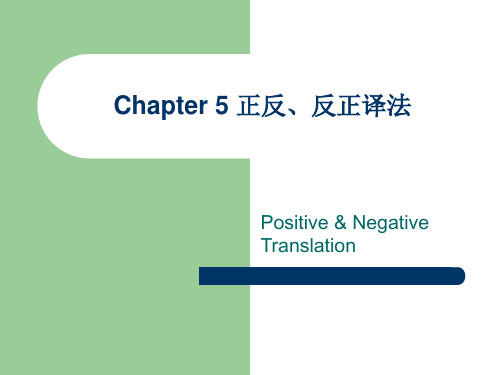
6.1_______________________(我们别无选择只好 另投旅馆住宿),since all the hotels here are with signs “Be Booked Up”. 提示:but + 动词原形 We could not help but look for another one to stay in. 6.2 The rich have their annoyances because ________________(有些人除了钱之外一无所有)。 someone have nothing but money
D. but 置于否定句后,起关系代词作用,相当 于that (which, who) not, 从而构成双重否定。
There is no rule but has exceptions. 译:条条规则都有例外。 (字面义:没有规则是没例外的)
6. CET 4 Translation
Chapter 5 正反、反正译法
Positive & Negative Translation
Homework
作业1.P18 Ⅰ-1,2,3 作业2.P27 Ⅱ-6,7,8 作业3.P36 Ⅱ-1,2,3
ห้องสมุดไป่ตู้
每次作业必须另起一页,下周上课时候交。请 学习委员提前提醒。
Review
B. nothing but只不过;
It's nothing but an ordinary watch. 这只是块普通的表。
他今天早上只喝了杯茶。 He had nothing but a cup of tea this morning.
- 1、下载文档前请自行甄别文档内容的完整性,平台不提供额外的编辑、内容补充、找答案等附加服务。
- 2、"仅部分预览"的文档,不可在线预览部分如存在完整性等问题,可反馈申请退款(可完整预览的文档不适用该条件!)。
- 3、如文档侵犯您的权益,请联系客服反馈,我们会尽快为您处理(人工客服工作时间:9:00-18:30)。
正反译与反正译由于国家、历史、地理、社会文化背景、风俗和生活习惯的不同,汉英两种语言在表达正说和反说时有很大差异,尤其英语在否定意义的表达上更为复杂,有时形式否定而实质肯定,或形式肯定而实质否定。
因此在这两种语言互译时,原文中正说的句子可能不得不处理成反说,或是用反说表达更为合适。
反之亦然。
翻译中,这种把正说处理成反说、把反说处理成正说的译法,就称为正反译法。
正反译法是翻译技巧中的一个重要方法,属于引申和修辞范围。
笼统地说,英语句子中含有“never”、“no”、“not”、“un-”、“im-”、“in-”、“ir-”、“-less”等否定词以及否定前缀或后缀的单词,以及汉语句子中含有“不”、“没”、“无”、“未”、“甭”、“别”、“休”、“莫”、“非”、“勿”、“毋”等否定词的即为反说,不含有这些否定词的即为正说。
但实际操作时,正说和反说的界限又变得极为模糊,例如“correct”可以翻译成“正确”(正说),也可以翻译成“没有毛病”(反说)。
因此,译文要采用正说还是反说,就要看译文语言的惯用表达和上下文的语气语态了。
在正反译法中,英译汉正转反(正说反译法)和汉译英反转正(反说正译法)是最为重要的两种正反译法。
PART I.英译汉正转反英语中有些否定概念是通过含有否定意义或近似否定意义的词来表达的,虽然形式是肯定的,但这类词大多是某些肯定词所引申或变化出来的反义词,或经过长期历史演变而引申出其他否定词义,即所谓的“含蓄否定词”或“暗指否定词”,这类词在译成汉语时,需要变成汉语的否定词组,必要时还需要作词类转换。
1.?名词—?? 含蓄否定名词主要有:shortness / shortage(不够; 不足)、lack(缺乏; 没有)、absence(不在)、failure(未能; 不成功)、defiance(不顾; 无视)、denial(否认; 否定)、exclusion(排除)、freedom(不; 免除)、refusal(不愿; 不允许)、loss(失去)等。
如;(1)Shortness of time has required the omission of some states.由于时间不够,没能访问那些国家。
(2) Behave yourself during my absence. 我不在时要规矩点。
(3) We were perplexed by his failure to answer the letter.他何以不回信,我们大惑不解。
2.?动词或动词短语—?? 英语中常见的含蓄否定动词包括:refuse(不愿; 不肯; 无法)、lack(缺乏; 没有)、defy(不服从; 不遵守; 不让)、forbid(不许)、stop(不准; 别)、ignore(不理; 不肯考虑; 无视; 不顾)、hate(不愿意)、miss(没听清楚; 没赶上)等。
如:(4) Children were excluded from getting in the building.孩子不许进入这幢楼房。
(5) Do you know why she is always trying to avoid you你知道她为什么老是不想见到你吗(6) Stop talking nonsense! 别胡说八道!(7) I missed what you said because of the noise outside.由于外面的噪音,我没听清楚你说的话。
(8) He was 75, but he carried his years lightly / easily.他75岁了,可是并不显老。
(9) The plan as it leaves much to be desired.目前这样的方案大有不足之处。
(10) The above facts insist on the following conclusions.上述事实使人们不能不得出以下结论。
3.?形容词或形容词短语—?? 含蓄否定形容词主要有:absent(不在; 不到; 不出席)、blind (看不到; 不注意)、awkward(不熟练;不灵活)、bad(令人不愉快的; 不舒服的)、dead(无生命的; 无感觉的; 不毛的)、difficult(不容易的)、foreign to(不适合的; 与…无关)、short of(不够)、poor (不好的; 不幸的; 不足的)、thin(站不住脚; 不够有力)等。
如:(11) The child is still awkward with his chopsticks.那孩子还不太会用筷子。
(12) What you said is foreign to the main issue of our discussion.你所讲的与我们讨论的主题无关。
(13) The corrupt police chief turned a blind eye to the open gambling in the town.这个受贿的警察局长对镇上的公开赌博佯装不见。
(14) We were watching the fluid situation with concern.我们关切地注视着动荡不安的局面。
(15) He would be the last man to say such things.他绝不可能说这种话。
4.介词或介词短语—?? 含蓄否定介词和介词短语主要有:without(没有)、against(不符合)、except(不包括)、beyond(无; 无法)、beside(不对; 不符合)、above(不至于)、behind(未能; 尚未; 还没有)、instead of (没有; 而不是)、aside from(不包括)、far from(绝不是; 还不; 非但不…(甚至)还…)、at large(未被捕; 未捉拿归案)、at a loss (不知所措; 不知如何是好; 完全不明白/不理解)、but for(要不是/没有…就不能/不会/无法…)、would rather…than(宁愿/宁可…也不)等。
如:(16) His answer is beside the mark. 他的回答文不对题。
(17) I have fallen behind with my correspondence.我有一些信件没有及时答复。
(18) It was beyond his power to sign such a contract.他无权签订这种合同。
(19) The speaker was speaking over my head.演讲者讲的内容太深奥了,我听不懂。
(20) The escaped criminal is still at large. 逃犯仍未捉拿归案。
(21) He is always at a loss what to say in front of strangers.他在生人面前总是不知要说什么。
(22) But for the workers’ help, we should not have succeeded in this experiment. 没有工人们的帮助,我们这个实验便不会成功。
5.?副词如:(23) I stayed awake almost the whole night. 我昨晚几乎一夜没睡。
(24) He dived into the water fully clothed and rescued the children.他衣服都没脱就跳入水中,把孩子们救了上来。
6.连词—?? 包括:before(还没来得及)、unless(如果没有…就…)等。
如:(25) Before I could say “thank you”, the postman had disappeared around the corner. 我还没来得及说声“谢谢”,邮递员已经消失在拐角处了。
(26) Unless there is any other business, we can end the meeting.如果没有别的事情,我们的会议就到此结束了。
7.?习惯用法和固定搭配如:(27) He is anything but a writer. 他绝不是一个作家。
(28) The decision has to come. 决定尚未作出。
(29) It is a wise father that knows his own child.无论怎样聪明的父亲也不见得了解自己的孩子。
(30) I’m only too pleased to work with you.能和你一起工作真是太高兴了。
(31) I’m but too glad to do so. 我非常愿意这样做。
(32) We will die before we give in. 我们宁死不屈。
(33) The critic had something of a case.批评家也并非全然没有道理。
(34) I am wiser than to believe such stories.我还不至于蠢到竟然相信这种谎言。
(35) He would rather die than go back on his comrades.他宁死也不出卖自己的同志。
8.?含有否定意义的谚语和警句如:(36) Road Ahead Closed. 前方施工禁止通行。
(37) Admission By Invitation Only. 非请莫入。
(38) Keep off the grass! 请勿践踏草坪!(39) Better to reign in hell than serve in heaven. 宁为鸡首,不为牛后。
(40) Seeing is believing. 百闻不如一见。
(41) Let sleeping dog lie. 莫惹是生非。
(42) Call a spade a spade. 直言不讳。
PART II.英译汉反转正英语中明显使用not、no等否定词或否定前后缀的反说语句有时却是含有肯定的含义,在这种情况下,我们在译成汉语时,可以用肯定形式来表达。
1.?名词如:(43) The machine has two serious disadvantages.那台机器有两个严重缺陷。
(44) The dishonesty of the city officials was exposed by the newspaper. 市政府官员们的欺诈行为在报纸上披露出来。
